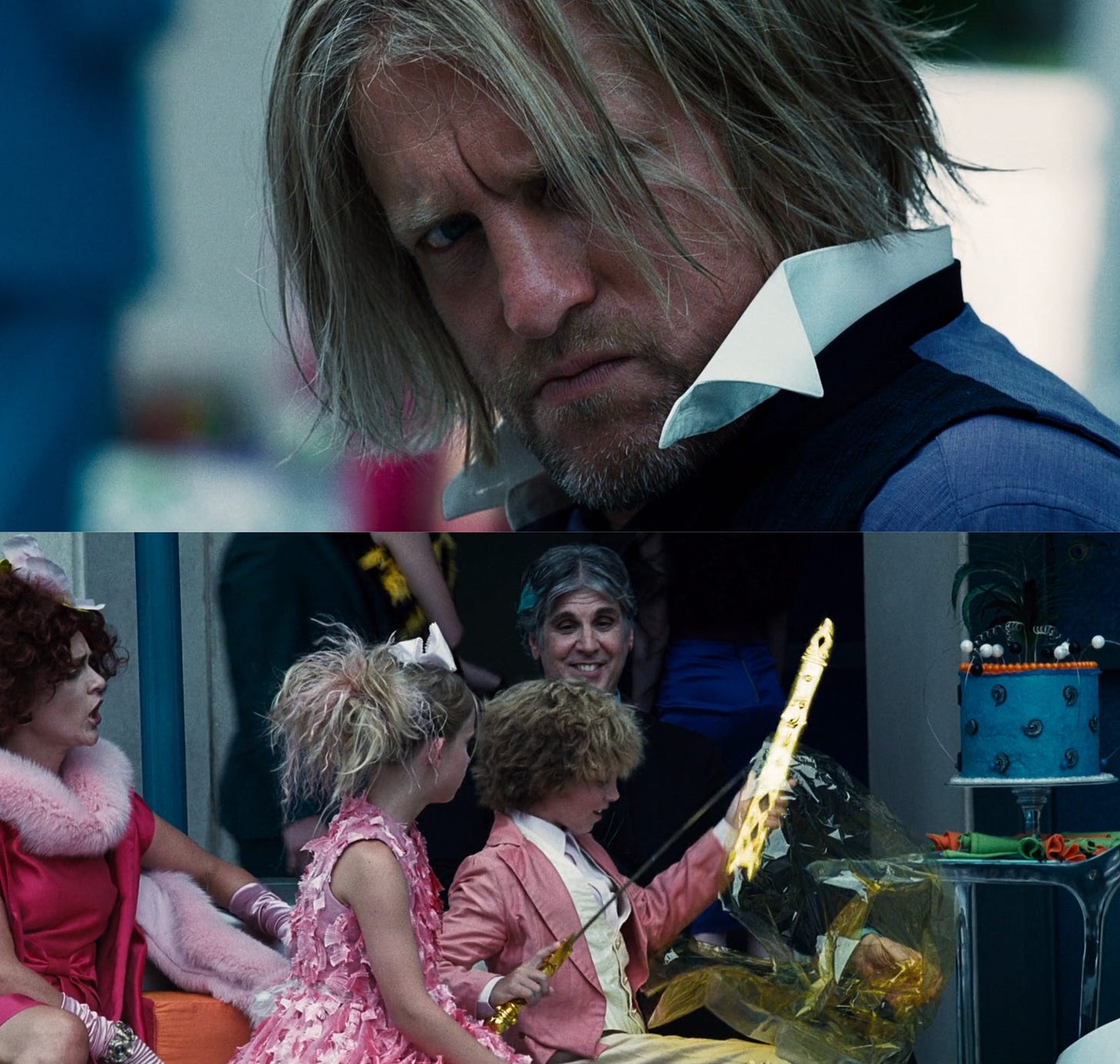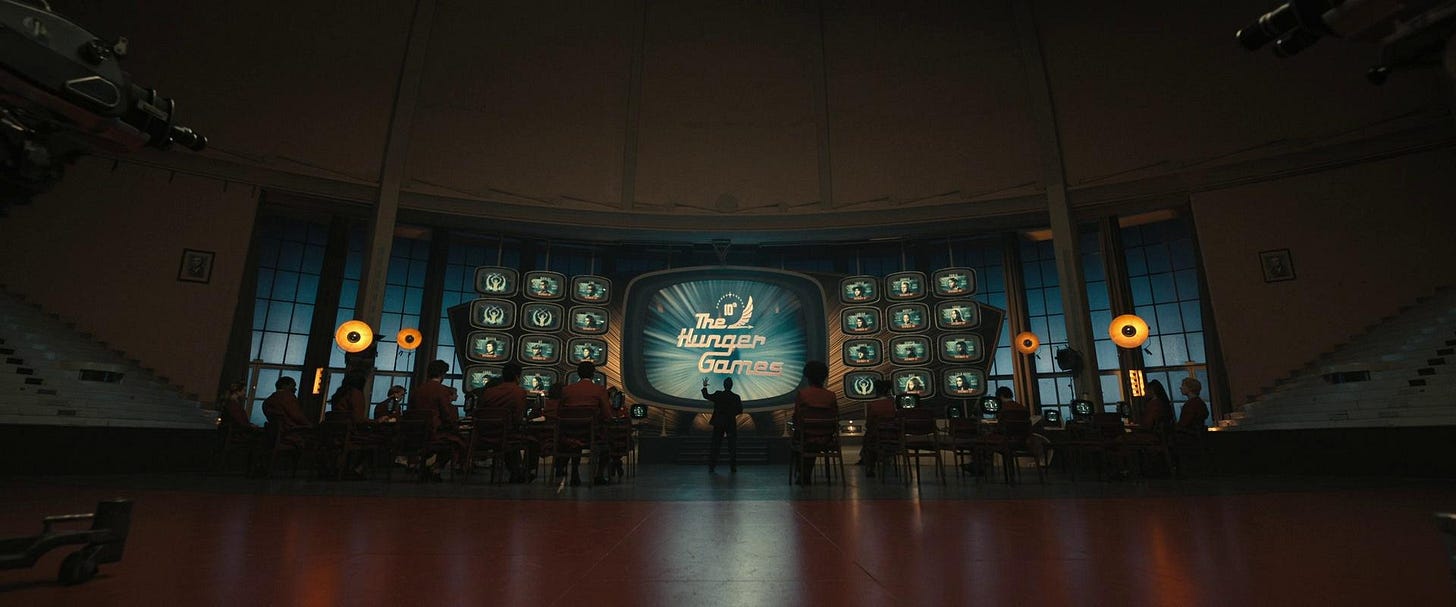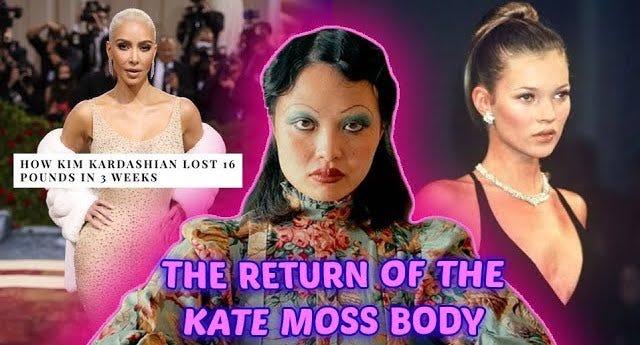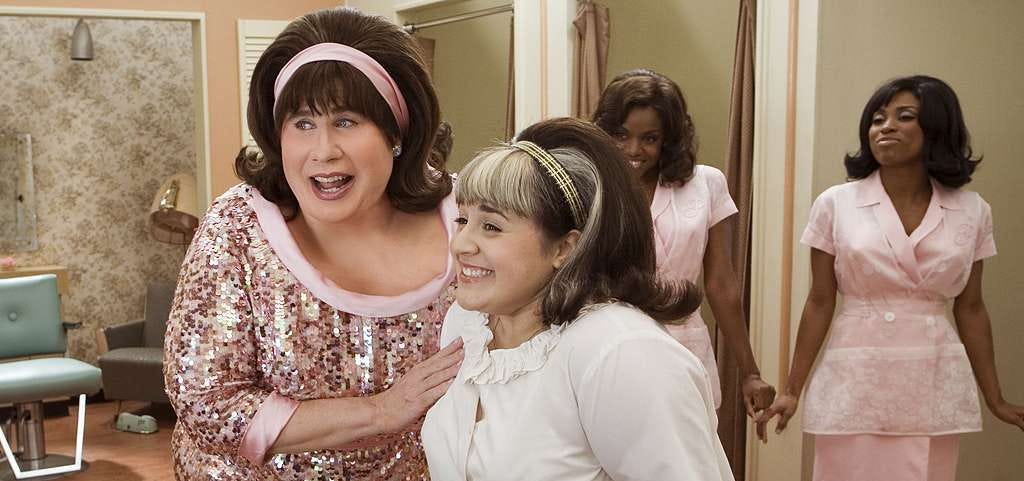** Minor Spoiler warning for ‘Sunrise on the Reaping’ **
After finishing ‘Sunrise on the Reaping’, I was reading an excerpt of Edmund D McGarry’s The Propaganda Function in Marketing (1958), when I came across this quote;
Advertising is the obtrusive display of the conflict of interest in the market place. It represents a parade of the contestants in the battle for market supremacy, each imploring the audience to follow him. By its very nature advertising must be prejudiced in order to be potent.
‘Contestants’, ‘parade’, ‘battle’, ‘audience’, ‘prejudiced’ - sounds familiar.
Hello fellow over-thinkers! Coming hot off the Goodreads press, this essay is a glorified rant about the intersection of THG series, philosophy, capitalism, propaganda, and fashion. Anyway, let’s crack on with it, and may the odds be ever in your favour.
I - Hume, Orwell, and Coconut Trees
“That's part of our problem. Thinking things are inevitable. Not believing change is possible.” (p.10)
I studied Hume in high school, and as soon as my philosophy exam was over, I made sure to forget almost everything I learnt from that subject. That was the case, until I read the epigraphs of Collin’s novel - and if you’re going to include both Hume AND Orwell, I will be so incredibly sat. There are two key Hume theories that I remember learning in high school. The first being that the person or ‘self’ is nothing more than a bundle of perceptions moving in rapid succession; not entirely relevant to today’s topic. The second, however, is the theory that Collins drew upon when planning this novel.
To the best of my memory’s ability, this was Hume’s theory; one cannot be certain that the sun will rise tomorrow because it rose this morning, since it has the same chance of rising as it does not at all - thus, one should not assume something will happen because it has a pattern of occurrence, as nothing is set in stone and every prediction is capable of proving fallible.
You shouldn’t be prevented from doing something because you believe it won’t happen tomorrow. The flapping of a butterfly’s wings in Melbourne today may cause a tornado in Vienna in a week's time, or merely make a leaf fall off of a nearby tree - but still, any change is change. When you have an opportunity (and/or the privilege) to make change, even if the result isn’t guaranteed for your lifetime, why wouldn’t you take it?
“And maybe it won't be realized today, maybe not in our lifetime. Maybe it will take generations. We're all part of a continuum. Does that make it pointless?” (p. 377)
“You think you just fell out of a coconut tree? You exist in the context of all in which you live and what came before you” - Kamala Harris (2023)
I don’t care that it became a meme - the coconut tree analogy is not only fantastic, but entirely relevant to our discussion. Within our current climate of activism, I think a key issue is the immediacy of results we expect from anything that we do. Just like the dopamine hit we get from scrolling through reels, some people find it harder to see the point of something if they do not have anything to show for it straight away; a skill attempted must be perfected on first attempt, otherwise, why bother? Do you think that feminism or civil rights would be where they are today had it not been for the sacrifices made and the multitude of waves that built upon their predecessors?
Both throughout SOTR and the entire Hunger Games series, Haymitch Abernathy is an amalgamation of this feeling of failure in the present, despite his acts of rebellion having great impact on the future. There would be no Girl on Fire (and subsequent deconstruction and revolution of Panem) without Haymitch’s display in the tribute parade and the arena, but there would also be no ‘rascal victor’ without the looming whispers of Lucy Gray Baird’s victory of Snow’s heart.
Today is a summation of thousands of ‘yesterdays’, the foundation that history sets for us allows us to move forwards in time, hoping to not repeat the same mistakes; after all, “who controls the past controls the future [,] who controls the present controls the past” (Orwell, 1949), and this is evidently present in Sunrise on the Reaping. For the citizens of Panem, the Games act as the only glimpse of life beyond their own - and this glimpse paints their fellow districts not as allies, but as an enemy. That’s propaganda, baby!
II - Propaganda, Capitalism, and the crisis of ‘Woke’
‘They will not use my tears for their entertainment.’ (p.82)
Haymitch’s character encapsulates the fear of having our identities corrupted to enable someone else's agenda; our emotions heightened, only for you to edit and capitalise on our pain - of course, without any compensation or compassion.
Children are forced to act as though this was their choice. A rebellion, that happened decades before your birth, was your fault, and now you, and your children, must pay the price in blood. The errors of others from the past century weigh down on the shoulders of today’s youth, and the government doesn't expect them to fully comprehend the gravity of it, because otherwise, how would this punishment be effective?
They pick district children, who are vulnerable and relatively ‘innocent’, rather than adults, because children need to be taught a lesson, and fear is the Capitol’s best teacher. Not only to fear being brutally sacrificed on broadcast television, but to accept starvation, poverty, and/or addiction as everyday life, and then ultimately death, if you managed to evade reaping; regardless, your existence serves the Capitol, nothing more, and the adults no longer need propaganda to tell them this - life’s beat them down enough to remind them every day.
The Games is its own marketing scheme, attempting to sell the ideologies of its totalitarian government, through not only the spectacle of murdering children, but in the routine of the event itself. What should’ve evoked empathy has become a desensitised event; for 75 years, atrocity had been capitalised into an annual reminder intended for the public.
The system wants you to be desensitised to violence, to injustice, poverty, suffering of those different to you; it isn’t merely a killing machine to those it televises, it’s killing our ability to feel anything for anyone else - thus, inhibiting our capability to see behind the curtain and rise against it.
Thanks to the internet, discussions have never been more democratic than they are at this very moment. Think of the public outrage of the genocide in Gaza or any political event (elections etc) - the power to create change is no longer limited to those with money and power, especially when communication and community are wielded as the people’s power. At the same time, however, technology can go down a different rabbit hole; instead of empowering inclusivity and an overall positive urge for change, it goes into the dregs of hell and suddenly becomes a conservative billboard aiming to take your opinions and rights away. The duality of the internet astounds me!
This is why I get particularly frustrated when (older) people tell me they ‘hate the woke’ (a direct quote from a 50 year old man). In most cases, they mean the people who throw paint at famed artworks and have ‘too many’ tattoos - aka, the ‘crazy’ far side of the left. Besides all that being an exaggeration and over-generalisation, what I can’t actually understand is why certain demographics are SO opposed to being ‘woke’, when all it means is having the ability to have empathy and recognise / care about social justice. God forbid I see someone suffering and can’t just sit there and get on with my privileged day. Instead, the word has become a prick in many’s side. The term has been weaponised by the far-right to make the left bicker amongst themselves, while the centralists flock away to a group promising sanctuary in ‘free speech’ - despite their entire platform being founded on suppressing thousands of texts that include the words ‘feminism’ and ‘diversity’, among others.
III - District Fashion, ‘Merit’, and lots of Hairspray
Another side-tangent; last one I promise!
There’s a scene in SOTR I’ve been overthinking a lot - the Tribute Parade - and in particular, the disrespect of District Twelve shown through their clothing (or lack of).
For context, by the second Quarter Quell, District 12 tributes have become miserably accustomed to the tradition of wearing cheap and tattered hand-me-down coal miner costumes from the sacrificed tributes before them. Every year, the district is forgotten, by both sponsors and history, because of their attire the nation has grown tired of - to quote their stylist, ‘No-one cares about Twelve’ (p.72). The larger the number (of the district), the less society cares.
According to the Vogue Business Fall 25’ Size Inclusivity Report (and now transcribed by NY Times);
Of 8,703 looks in 198 shows and presentations, only 2 percent were midsize (defined as U.S. size 6 to 12) and only 0.3 percent were plus-size. (Plus-size and midsize models are also known as “curve models.”) This was worse than the representation in the spring shows, which … included 0.8 percent plus-size looks and 4 percent midsize.
We’ve been forcibly receding into our 90s roots of heroin chic and ‘thinness = malnourishment’ the past few years, but now it feels that there isn’t room for anyone above a size 6 to even exist anymore. Sacrifices have to be made, and it’s always the same group that loses. The larger the number, the less society cares.
Most of us saw the Hairspray inspired Vogue shoot featuring Gigi Hadid - my jaw has never hit the floor faster. Did reading the room take up too much space on that set filled with thirty size 0 models? How did they miss the point of the film THAT MUCH?? Yes, Hairspray does feature heavy themes like segregation (and hairspray, according to Vogue), but the focus (applicable to both black and white characters) was body positivity, as well as the intersectionality that conjoins both issues. John Travolta did not serve that hard for you to entirely disregard the context and themes of Waters’ masterpiece!!!
Plus-size clothing; plagued by ugly florals, limited online releases, hand-me-downs, unflattering shapes and patterns. Brands don’t prioritise inclusively sized fashion because they don’t deem it profitable, with major fashion designers using the over-saturated excuse of ‘it just doesn’t suit my vision’. Gag me with a spoon.
Diversity is now frequently being neglected, and purposely refuted, for the sake of ‘the vision’ and ‘merit’. Excuses. At least within the fashion/beauty sphere, merit means virtually nothing - it’s a genetic lottery of nepotism and privilege, in both our reality and Collins’ dystopia. We know the Careers didn’t earn nicer costumes and other perks because of their ‘merit’, it’s because of where they were born, just as the other districts (10,11 and 12) are underestimated because of where they come from. In theory, The Games want to create the illusion of a fair fight (and maybe, long ago, it was); however, the reality tended to lean towards ‘all animals are equal, but some are more equal than others’ (Orwell, 1945). This isn’t only applicable to compare the Capitol to the District children, but it creates competition between already divided Districts.
I’m not saying that District Twelve was intentionally written to critique beauty standards, obviously. Instead, I’m suggesting that there are parallels to be found between the treatment of impoverished districts and the groups considered ‘diversity’ within the fashion industry, and wider society in general.
In a 2023 NY Times article, Vanessa Friedman wrote “for an industry that is supposed to be about the future, it was an awfully retrograde year”. Nice to see that things have changed, it just sucks that this change meant it’s gotten so much worse.
IV - Concluding thoughts
I wonder if the mere existence of our phones is its own form of propaganda? Well, hell fucking yeah, it is.
“…we keep delegating tasks to technology, compensating for human frailties such as fatigue and enhancing qualities like productivity and precision. Simultaneously, technology deepens our dependencies by entertaining us, shaping our opinions, and mediating our interactions, thereby exerting a profound influence on our behavior and the habits that define how we live.” (Sushchenko and Yatsenko, 2025)
Unfortunately, the devices we’ve grown dependent on like to push agendas down our throats, disguised as inescapable advertisements, whilst simultaneously giving us access to information that very well shapes our opinions and ethics. We saw this highlighted over the course of the pandemic, with ‘incels’ and the rapid increase of racist, misogynist, and homophobic forums appearing all over internet spaces, no longer confined to the dark corners they once crawled to (thank you El*n). Entire social media platforms are metaphorical campaign platforms for bigotry, now allowing a sitting first-world president to post an AI-generated video of his vision for the Gaza Strip - despite being responsible for the thousands of murders that have taken place there - without fear of consequence. Like imagine if Snow had access to Stan twitter and we had live Popcrave updates of each Hunger Games - I just KNOW that some of you would eat that up.
With both Capitol propaganda and AI, the discourse surrounding anything they generates comes down to one question - real or not real?
Honestly, I’m exhausted from writing and rambling through this essay, and I want to stop before I get ahead of myself. So I’ll leave you with another Orwell quote, until next time x
- f.
Until they become conscious they will never rebel, and until after they have rebelled they cannot become conscious. (1949)
Sources:
- McGarry, ED (1958), ‘The Propaganda Function in Marketing’, Journal of Marketing, vol. 23, no. 2, pp. 131–139
- Orwell, G (1945), Animal Farm
- Orwell, G (1949), Nineteen Eighty-Four
- Sushchenko, A & Yatsenko, O (2025), ‘Human, All Too Human: Do We Lose Free Spirit in the Digital Age?’, Humanities (2076-0787), vol. 14, no. 1, p. 6








